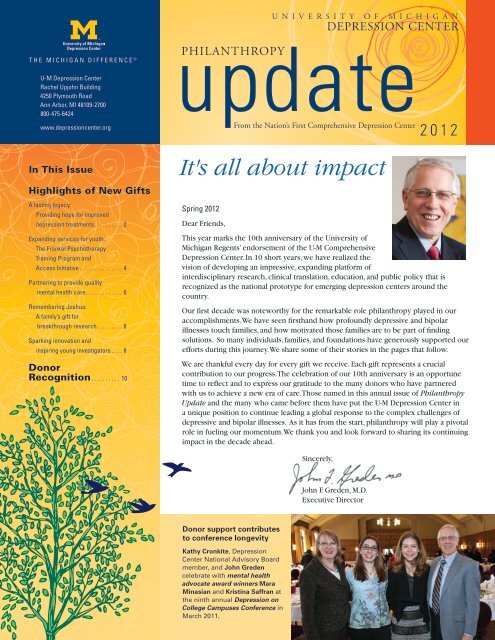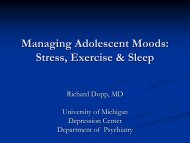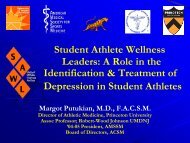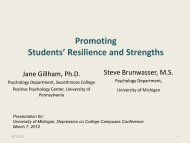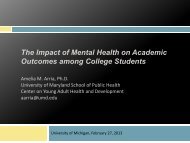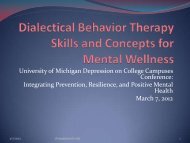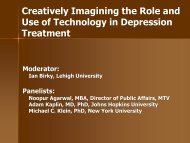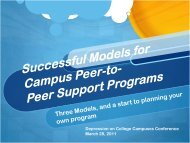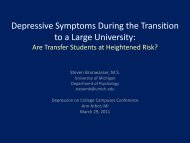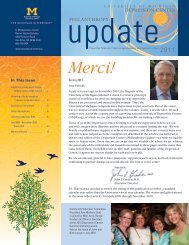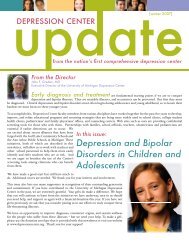Providing Hope For Improved depression treatments - University of ...
Providing Hope For Improved depression treatments - University of ...
Providing Hope For Improved depression treatments - University of ...
Create successful ePaper yourself
Turn your PDF publications into a flip-book with our unique Google optimized e-Paper software.
<strong>University</strong> <strong>of</strong> Michigan<br />
Depression center<br />
The Michigan Difference ©<br />
U-M Depression Center<br />
Rachel Upjohn Building<br />
4250 Plymouth Road<br />
Ann Arbor, MI 48109-2700<br />
800-475-6424<br />
update<br />
Philanthropy<br />
From the Nation’s First Comprehensive Depression Center<br />
2012<br />
www.<strong>depression</strong>center.org<br />
In This Issue<br />
Highlights <strong>of</strong> New Gifts<br />
A lasting legacy:<br />
<strong>Providing</strong> hope for improved<br />
<strong>depression</strong> <strong>treatments</strong> .......... 2<br />
Expanding services for youth:<br />
The Frankel Psychotherapy<br />
Training Program and<br />
Access Initiative ............... 4<br />
Partnering to provide quality<br />
mental health care ............. 6<br />
Remembering Joshua:<br />
A family’s gift for<br />
breakthrough research ......... 8<br />
Sparking innovation and<br />
inspiring young investigators .... 8<br />
Donor<br />
Recognition .......... 10<br />
It's all about impact<br />
Spring 2012<br />
Dear Friends,<br />
This year marks the 10th anniversary <strong>of</strong> the <strong>University</strong> <strong>of</strong><br />
Michigan Regents’ endorsement <strong>of</strong> the U-M Comprehensive<br />
Depression Center. In 10 short years, we have realized the<br />
vision <strong>of</strong> developing an impressive, expanding platform <strong>of</strong><br />
interdisciplinary research, clinical translation, education, and public policy that is<br />
recognized as the national prototype for emerging <strong>depression</strong> centers around the<br />
country.<br />
Our first decade was noteworthy for the remarkable role philanthropy played in our<br />
accomplishments. We have seen firsthand how pr<strong>of</strong>oundly depressive and bipolar<br />
illnesses touch families, and how motivated those families are to be part <strong>of</strong> finding<br />
solutions. So many individuals, families, and foundations have generously supported our<br />
efforts during this journey. We share some <strong>of</strong> their stories in the pages that follow.<br />
We are thankful every day for every gift we receive. Each gift represents a crucial<br />
contribution to our progress. The celebration <strong>of</strong> our 10th anniversary is an opportune<br />
time to reflect and to express our gratitude to the many donors who have partnered<br />
with us to achieve a new era <strong>of</strong> care. Those named in this annual issue <strong>of</strong> Philanthropy<br />
Update and the many who came before them have put the U-M Depression Center in<br />
a unique position to continue leading a global response to the complex challenges <strong>of</strong><br />
depressive and bipolar illnesses. As it has from the start, philanthropy will play a pivotal<br />
role in fueling our momentum. We thank you and look forward to sharing its continuing<br />
impact in the decade ahead.<br />
Sincerely,<br />
John F. Greden, M.D.<br />
Executive Director<br />
Donor support contributes<br />
to conference longevity<br />
Kathy Cronkite, Depression<br />
Center National Advisory Board<br />
member, and John Greden<br />
celebrate with mental health<br />
advocate award winners Mara<br />
Minasian and Kristina Saffran at<br />
the ninth annual Depression on<br />
College Campuses Conference in<br />
March 2011.
Highlights<br />
A lasting legacy:<br />
The overarching goal<br />
<strong>of</strong> the award is to<br />
transform the quality <strong>of</strong><br />
life <strong>of</strong> those living with<br />
<strong>depression</strong> and bipolar<br />
disorder.<br />
<strong>Providing</strong> hope for<br />
Helmut F. Stern, a businessman, investor, and<br />
accomplished art collector, is well known for his<br />
generous support <strong>of</strong> the humanities, public health, public<br />
policy, and the arts and sciences at the <strong>University</strong> <strong>of</strong><br />
Michigan. Stern’s recent gift to endow a research award at<br />
the U-M Depression Center, made in honor <strong>of</strong> the relative<br />
who enabled him to escape Nazi Germany, carries particular<br />
personal significance.<br />
Stern came to the U.S. in 1938 during the period when<br />
Hitler’s regime had taken control <strong>of</strong> his homeland (Stern was<br />
born in Hannover). He says he likely would not have made<br />
it out <strong>of</strong> Germany alive without the assistance <strong>of</strong> his uncle,<br />
Oscar Stern, a Dutch businessman who helped him obtain<br />
the visa he needed.<br />
While few details are known about Oscar’s personal or<br />
pr<strong>of</strong>essional life, it is clear that he was successful in his work<br />
and had immense loyalty to his family. While on business<br />
in Argentina, Oscar learned that Hitler’s forces had invaded<br />
Holland and captured three <strong>of</strong> his siblings whom he had been<br />
sheltering in his home. Shortly thereafter they were taken to<br />
the death camps. With enormous remorse for not having been<br />
able to safeguard his family, Oscar committed suicide.<br />
In 2011, to honor Oscar’s generosity, bravery, and compassion,<br />
Helmut and his wife Candis established the Oscar Stern<br />
Award for Depression Research.<br />
The overarching goal <strong>of</strong> the award is to transform the quality<br />
<strong>of</strong> life <strong>of</strong> those living with <strong>depression</strong> and bipolar disorder<br />
by promoting innovative and translational research by<br />
Depression Center investigators. The fund will support highimpact,<br />
novel ideas leading to strategic interventions that are<br />
consistent with the Depression Center’s mission to detect<br />
<strong>depression</strong> and bipolar disorders earlier, treat them more<br />
effectively, and prevent their recurrence and progression.<br />
2 • <strong>University</strong> <strong>of</strong> Michigan Depression Center • www.<strong>depression</strong>center.org
<strong>of</strong> New Gifts…<br />
improved <strong>depression</strong> <strong>treatments</strong><br />
<strong>For</strong> 70 years, Helmut Stern has made his home in Ann<br />
Arbor. He originally came to enroll in medical school, but<br />
soon became consumed by a series <strong>of</strong> manufacturing<br />
business ventures whose successes grew to become a<br />
major part <strong>of</strong> his life’s work.<br />
Although Stern never attended U-M, he has demonstrated<br />
a remarkable and long-standing commitment to<br />
supporting the university financially, and as an advisor<br />
and volunteer, all ways <strong>of</strong> giving back to the university<br />
community that has so personally enriched his own life.<br />
Stern shies away from seeking recognition for his many<br />
charitable contributions to U-M over the years. Instead, he<br />
considers himself fortunate to have overcome adversity<br />
in many forms throughout his life, and is grateful to the<br />
individuals and institutions who have helped him find<br />
success and fulfillment. His philanthropy is, in his words,<br />
“a way for me to repay the set <strong>of</strong> circumstances that made<br />
it possible for me to enrich my life.”<br />
And even though Stern long ago chose to devote himself<br />
to a career in business rather than medicine, he remains<br />
fascinated with the medical field and the scientific basis<br />
behind methods <strong>of</strong> prevention<br />
and treatment. The Depression<br />
Center is extraordinarily grateful<br />
for this gift that both honors<br />
Oscar Stern and, through<br />
the translation <strong>of</strong> research<br />
innovation, can pr<strong>of</strong>oundly<br />
benefit so many others.<br />
“I’m extremely grateful<br />
for this award. It will<br />
allow us to assess the<br />
utility <strong>of</strong> this new<br />
and exciting cortisol<br />
measurement tool and<br />
hopefully improve our<br />
understanding and<br />
treatment <strong>of</strong> <strong>depression</strong>.”<br />
—Srijan Sen, M.D., Ph.D.<br />
The First Oscar Stern Award Recipient:<br />
Srijan Sen, M.D., Ph.D.<br />
In March 2012, Srijan Sen, M.D., Ph.D., assistant<br />
pr<strong>of</strong>essor <strong>of</strong> psychiatry, was named the<br />
first recipient <strong>of</strong> the Oscar Stern Award for<br />
Depression Research. His project will examine<br />
the relationship between<br />
the development <strong>of</strong><br />
<strong>depression</strong> symptoms<br />
under stress and<br />
measures <strong>of</strong> cortisol (a<br />
stress hormone) obtained<br />
through hair samples.<br />
Along with Depression<br />
Center member James<br />
Abelson, M.D., Ph.D.,<br />
Sen and his team will<br />
incorporate the new<br />
technology <strong>of</strong> hair<br />
cortisol measurement<br />
into an existing study <strong>of</strong><br />
physicians during their<br />
internship year, a time<br />
when rates <strong>of</strong> stress<br />
and <strong>depression</strong> have<br />
been shown to increase<br />
dramatically. Sen will assess whether this<br />
unique measure <strong>of</strong> cumulative stress (blood and<br />
saliva measure only momentary stress cortisol<br />
levels) can be used as a biomarker for major<br />
<strong>depression</strong> and serve as an inexpensive way to<br />
diagnose <strong>depression</strong>, aid in treatment selection,<br />
and help monitor how patients respond to<br />
treatment. Exploring whether this new measure<br />
<strong>of</strong> cortisol predicts or reflects <strong>depression</strong> levels<br />
in these young physicians opens the door for<br />
use <strong>of</strong> this measure in all populations.<br />
Helmut and Candis Stern<br />
Philanthropy update 2012 • 3
Expanding<br />
The Frankel<br />
“I believe that this is a<br />
population that is so<br />
<strong>of</strong>ten forgotten, or not<br />
heard. I feel fortunate<br />
to be in a position to<br />
help make a difference.”<br />
—Jo Elyn Frankel Nyman<br />
Jo Elyn Frankel Nyman comes from a family that<br />
has long supported a variety <strong>of</strong> charitable causes<br />
and service organizations both within the <strong>University</strong><br />
<strong>of</strong> Michigan and throughout metropolitan Detroit. A<br />
trained psychotherapist with a passion for children and<br />
adolescents, Jo Elyn approached the U-M Health System<br />
(UMHS) in late 2010 with a desire to help youth and<br />
families who struggle with mental health issues, hoping<br />
to provide earlier and better access to care and more<br />
effective <strong>treatments</strong>.<br />
Nyman believes in a holistic approach to mental health<br />
care that includes mindfulness, meditation, and, more<br />
generally, psychotherapy approaches that consider<br />
the whole child and family. She is keenly aware that<br />
many children and adolescents end up in hopeless<br />
situations, incarcerated, or with problems that worsen<br />
over time—and that they are hurting. She also knows<br />
that psychotherapy services are sometimes the most<br />
appropriate treatment and <strong>of</strong>ten produce the best<br />
outcomes when used in combination with medication.<br />
Yet unfortunately, largely because Michigan has a shortage<br />
<strong>of</strong> well-trained clinicians who can provide psychotherapy<br />
services, many youth are treated by providers whose<br />
first-line treatment tends to be medication alone. Families<br />
from underserved and rural areas, even if insured, cannot<br />
make the trip to southeastern Michigan for ongoing care<br />
through UMHS, and our clinics do not have the capacity<br />
to treat everyone who seeks care. Jo Elyn felt compelled<br />
to help advance earlier identification and intervention<br />
strategies and to address this gap in access to quality<br />
mental health services. She has partnered with the U-M<br />
Depression Center to create a program to do just that.<br />
With a generous gift from Jo Elyn and George Nyman<br />
through the Samuel and Jean Frankel Health and Research<br />
Foundation in 2011, the Depression Center established the<br />
Frankel Program for Improving Access to Quality Mental<br />
Health Services for Children, Adolescents, and Young Adults.<br />
A team including Program Director Cheryl King, Ph.D.,<br />
Program Manager Melissa Webster, M.S.W., Depression<br />
Center Executive Director John Greden, M.D., and a select<br />
group <strong>of</strong> child psychiatrists, clinical psychologists, and social<br />
workers has launched two major Frankel Program initiatives:<br />
The goal <strong>of</strong> the Frankel Psychotherapy Training Program<br />
is to build capacity to provide quality psychotherapy<br />
services within the U-M community, the surrounding<br />
region, and statewide, an initiative that will significantly<br />
impact children and families.<br />
4 • <strong>University</strong> <strong>of</strong> Michigan Depression Center • www.<strong>depression</strong>center.org
services for youth<br />
Psychotherapy Training Program and Access Initiative<br />
The Depression Center is now <strong>of</strong>fering intensive<br />
workshop training to mental health providers from across<br />
the state. Those who choose to participate in extended<br />
follow-up supervision will obtain case-based guidance and<br />
feedback, culminating in program certification. Current<br />
trainings include:<br />
• Behavioral Activation<br />
• Trauma-focused Cognitive Behavioral Therapy<br />
• Cognitive Behavioral Analysis System for Psychotherapy<br />
• Mindfulness-Based Cognitive Therapy<br />
The goal <strong>of</strong> the Frankel Psychotherapy Access Initiative<br />
is to reach more disadvantaged children and families<br />
in southeastern Michigan by improving their access<br />
to psychotherapy and related services. “My goal is that<br />
no child or teen who needs help is ever turned away<br />
because <strong>of</strong> financial or insurance issues,” Nyman says. The<br />
strategic plan for this initiative will emphasize providing<br />
more accessible psychotherapy services to disadvantaged<br />
families by integrating these services with their other<br />
healthcare at university-affiliated centers and clinics.<br />
In addition, the program anticipates providing free groups<br />
to children and families on topics that may include:<br />
• Using mindfulness to build resilience through awareness<br />
<strong>of</strong> thoughts and feelings<br />
• Helping families understand and cope after loss<br />
• Raising children with challenging behaviors<br />
• Enhancing family relationships through attachment<br />
“Jo Elyn shares our vision <strong>of</strong> providing access to quality<br />
mental health services to those young people who need<br />
them most,” King says. “With the Frankel family’s support,<br />
we are finally able to take major steps toward translating<br />
this vision into reality. I am excited to be part <strong>of</strong> this<br />
initiative, believe it will have long-term impact, and am so<br />
very grateful for her support.”<br />
Philanthropy update 2012 • 5
Partnering to provide<br />
Since the late 1980s, the Michigan-based<br />
Ethel & James Flinn Foundation has<br />
provided over $3 million to the Depression<br />
Center and U-M Department <strong>of</strong> Psychiatry to<br />
support a shared vision <strong>of</strong> enhancing the lives<br />
<strong>of</strong> those living with mental illness.<br />
Established by the Flinn family in 1975, the Flinn Foundation is dedicated<br />
to improving the quality, scope, and delivery <strong>of</strong> mental health services<br />
in Michigan for people <strong>of</strong> all ages through the sponsorship <strong>of</strong> grants to<br />
create, evaluate, and implement best practice mental health treatment<br />
programs. In addition, the foundation works to increase resources<br />
available to community mental health organizations, particularly those<br />
focused on underserved and vulnerable populations.<br />
”The Flinn Foundation looks forward to continued collaboration and<br />
partnership with the Depression Center in the pursuit <strong>of</strong> improved<br />
mental health care in Michigan,” said the Foundation’s Executive Director,<br />
Andrea Cole. Depression Center researchers and staff are grateful for the<br />
Flinn Foundation’s generous support over the years, which includes<br />
current funding for the two innovative projects described here.<br />
Coping with a cancer diagnosis:<br />
Film tells personal stories <strong>of</strong> resilience<br />
A previous issue <strong>of</strong> our annual report announced a<br />
gift from Dr. Marylen Segal Oberman, a psychologist<br />
and cancer survivor, who wanted to create a video<br />
journal <strong>of</strong> individuals and their family members<br />
describing how they coped during difficult times<br />
following cancer diagnosis and treatment. Just<br />
released, Reflections on the Experience <strong>of</strong><br />
Cancer includes rich narratives from people who<br />
have lived through the anxiety, <strong>depression</strong>, and<br />
other challenges that cancer may bring.<br />
View the video by going<br />
to youtube.com and<br />
searching for Reflections on<br />
the Experience <strong>of</strong> Cancer.<br />
6 • <strong>University</strong> <strong>of</strong> Michigan Depression Center • www.<strong>depression</strong>center.org
quality mental health care<br />
Funds help launch “HomeFront Strong”<br />
Michelle Kees, Ph.D., a child psychologist with extensive<br />
experience in working with families under stress and at high<br />
risk for mental health issues, leads HomeFront Strong, a<br />
project to help the families <strong>of</strong> service members and veterans<br />
build resilience and enhance their mental wellness.<br />
“Military families are <strong>of</strong>ten overwhelmed by the many<br />
challenges—to relationships, parenting, and communication—<br />
that can arise during the deployment cycle,” says Kees. “Yet most military mental<br />
health programs focus on the needs <strong>of</strong> the service member, with only limited<br />
support extended to the family members who are also facing challenges. We intend<br />
to fill this void, and the Flinn Foundation is helping us do just that.”<br />
HomeFront Strong was created to promote positive adjustment and help counteract<br />
mental health symptoms in military spouses and partners. The long-term goal, after<br />
piloting, evaluating, and refining the program, is to disseminate HomeFront Strong<br />
broadly across the country for use by other mental health service providers working<br />
with military families.<br />
“Funding from the Flinn Foundation has been pivotal to launching HomeFront Strong<br />
in Michigan,” Kees says. “Military families have made enormous sacrifices in our<br />
communities, and it is an honor to join with the Flinn Foundation in giving back.”<br />
Support for managing insomnia in teens<br />
Sleep researcher Deirdre Conroy, Ph.D., leads a Flinn Foundationsponsored<br />
study <strong>of</strong> young people dealing with both <strong>depression</strong><br />
and sleep problems. Untreated insomnia in individuals with a<br />
history <strong>of</strong> <strong>depression</strong> can increase the likelihood that depressive<br />
symptoms will return, and also elevates the risk <strong>of</strong> suicide. Ninety<br />
percent <strong>of</strong> adolescents with <strong>depression</strong> report suffering from<br />
insomnia, yet clinicians currently have no available options other<br />
than medications to treat their sleep disturbances.<br />
“These teens need a treatment option that not only improves their sleep, but is also<br />
acceptable and practical enough for them to stick with,” Conroy says. Her study<br />
will determine how Cognitive Behavioral Therapy for Insomnia (CBTI), the standard<br />
non-drug therapy for adult insomnia, can be adapted for the specific needs <strong>of</strong><br />
adolescents with <strong>depression</strong>.<br />
“Ultimately, successful management <strong>of</strong> insomnia can reduce rates <strong>of</strong> <strong>depression</strong>,<br />
anxiety, learning problems, and substance use disorders,” Conroy says. “We hope<br />
that once the new insomnia treatment is developed with input provided by teens,<br />
other teens will be more inclined to give it a try because it will target their unique<br />
sleep issues.” She adds, “We’re so thankful for the Flinn Foundation’s support to<br />
address this important health issue during the teen years, before problems escalate.”<br />
Philanthropy update 2012 • 7
Remembering Joshua: A family’<br />
Carl Stern (LSA ‘56) has been passionate about the<br />
<strong>University</strong> <strong>of</strong> Michigan since he arrived by train from<br />
New York almost 60 years ago to begin his freshman year.<br />
Two <strong>of</strong> his sons graduated from U-M in the ‘90s, further<br />
boosting his Michigan fondness and pride. And Carl, a<br />
steadfast fan <strong>of</strong> Michigan football, continues to travel from<br />
California to attend games each season.<br />
Carl’s youngest son, Joshua Judson Stern, graduated from<br />
U-M in 1997 with a degree in economics and held a variety<br />
<strong>of</strong> jobs before enlisting in the Army at the relatively late age<br />
<strong>of</strong> 30. He went on to serve two tours <strong>of</strong> duty in Iraq. After<br />
his service, Josh traveled extensively throughout southeast<br />
Asia, bringing his keen sense <strong>of</strong> adventure and passion for<br />
new experiences everywhere he went. He established loyal<br />
friendships all over the world with his good humor, kindness,<br />
and gift for empathy. His parents were not aware <strong>of</strong> many <strong>of</strong><br />
these experiences and relationships until after October 2010,<br />
when Josh took his own life at age 35.<br />
Since his passing, which took those close to him by<br />
complete surprise, Carl and his wife Jackie have been<br />
searching for answers. They've learned enough about Josh’s<br />
last few years to determine that he suffered from deep<br />
<strong>depression</strong>. “Nobody knew it,” says Carl Stern, who even<br />
retraced some <strong>of</strong> Joshua’s recent travels in 2011. While he<br />
didn’t learn a great deal more about the course <strong>of</strong> his son’s<br />
illness, Carl did meet many in the network <strong>of</strong> devoted friends<br />
who loved Joshua for his generous spirit and adventurous<br />
nature.<br />
To pay tribute to their son’s memory, the Sterns recently<br />
established the Joshua Judson Stern Memorial Fund at<br />
the Depression Center. When asked what inspired them<br />
to give, Carl identified two key reasons. First, in the stem<br />
cell research they support, they find particular meaning<br />
in its potential to better understand the development and<br />
progression <strong>of</strong> a depressive illness, allowing for earlier<br />
detection and treatment. And second, the Depression<br />
Center’s mission to disseminate public education and<br />
outreach about <strong>depression</strong> and related illnesses is deeply<br />
and personally significant to them. “Jackie and I want to do<br />
anything we can to bring about greater awareness about<br />
<strong>depression</strong>, particularly so that other parents won’t have to<br />
experience what we have,” Carl says.<br />
Sparking innovation and inspiri<br />
Entrepreneur, Ann Arbor-area<br />
businessman and philanthropist<br />
Phil F. Jenkins (left) has always been<br />
focused on results.<br />
More than 60 years ago, Jenkins<br />
transformed his family’s small<br />
business into a hugely successful<br />
global supplier <strong>of</strong> equipment for<br />
airports, municipalities, agriculture,<br />
and construction (Sweepster, Inc.).<br />
Today, philanthropy has become his way <strong>of</strong> life, and he<br />
uses his business acumen to steer his many and significant<br />
contributions toward what might be called “nimble<br />
opportunities”—that is, the people, institutions, and ideas<br />
that he perceives will have the greatest and most farreaching<br />
impact.<br />
Jenkins gives generously to the <strong>University</strong> <strong>of</strong> Michigan, the<br />
U-M Health System, and to numerous organizations across<br />
southeast Michigan. In part because <strong>of</strong> his own family’s<br />
experiences with <strong>depression</strong>— Jenkins’ late wife <strong>of</strong> 47 years,<br />
Lyn, struggled with the disease for many years—Jenkins has<br />
been actively involved in the Depression Center’s work since<br />
its inception. He has supported a major research fund and a<br />
pr<strong>of</strong>essorship, and serves on the Depression Center’s National<br />
Advisory Board. He also made a key contribution toward the<br />
construction <strong>of</strong> the Rachel Upjohn Building, home <strong>of</strong> the<br />
Depression Center, where the lobby bears his name.<br />
This past year, Jenkins provided funds to establish an<br />
annual research award at the Depression Center to spur<br />
creative advances in the treatment or self-management <strong>of</strong><br />
<strong>depression</strong> by empowering students and junior faculty to<br />
bring original ideas to life.<br />
8 • <strong>University</strong> <strong>of</strong> Michigan Depression Center • www.<strong>depression</strong>center.org
s gift for breakthrough research<br />
Joshua Judson Stern<br />
Stem Cell Research May Unlock<br />
Bipolar’s Mysteries<br />
The Heinz C. Prechter Bipolar Research group, in partnership with the<br />
A. Alfred Taubman Medical Research Institute’s Consortium for Stem<br />
Cell Therapies (CSCT), has embarked on innovative studies involving<br />
a special type <strong>of</strong> human cell that can be manipulated in the lab to<br />
better understand how bipolar disorder affects the brain, and how, at a<br />
cellular level, people respond to <strong>treatments</strong>.<br />
Stem cells are cells which have the ability to divide and develop into<br />
many different cell types in the body. The stem cells at the heart <strong>of</strong> this<br />
research are known as induced pluripotent stem cells, or iPSCs. The<br />
iPSCs in this particular research are skin cells donated by participants<br />
in the Prechter Program’s Longitudinal Study <strong>of</strong> Bipolar Disorder that<br />
have been “reprogrammed” with the ability to develop into cells found<br />
in other areas <strong>of</strong> the body, including the brain.<br />
Carl Stern (R) during a visit to one<br />
<strong>of</strong> U-M’s stem cell research labs,<br />
with Melvin McInnis, M.D., principal<br />
investigator <strong>of</strong> the Prechter<br />
Program, and Sue O’ Shea, Ph.D.,<br />
who helps lead the research<br />
Using these cells, “we will be able to see if<br />
there are differences in how the neurons <strong>of</strong> a<br />
person with bipolar disorder make connections,<br />
determine how they respond to different<br />
medications, and explore potential deficiencies in<br />
signaling pathways,” explains Sue O’Shea, Ph.D.,<br />
who helps lead the research at CSCT.<br />
Eventually, the hope is to create stem cell lines<br />
that can be used to study the development and<br />
progression <strong>of</strong> other brain conditions, including<br />
major <strong>depression</strong>.<br />
ng young investigators<br />
Danielle M. Novick, Ph.D. (left), a<br />
U-M psychiatry research fellow and<br />
Depression Center member, is the<br />
recipient <strong>of</strong> the first Phil F. Jenkins<br />
Award for Innovation in Depression<br />
Treatment.<br />
With these research funds, Novick will<br />
identify ways that current technology<br />
might allow individuals to better<br />
monitor their moods, increase their treatment engagement<br />
and adherence, and also help guide mental health care<br />
providers in making more informed and personalized<br />
treatment decisions for their patients.<br />
The Jenkins-funded project will add a powerful new<br />
dimension to Novick’s existing research that uses actigraphs<br />
—instruments that look like standard wristwatches—to<br />
measure a person’s daily physical activity and light exposure.<br />
This information can then be used to estimate some <strong>of</strong> the<br />
body’s biological rhythms. Because many effective <strong>treatments</strong><br />
for <strong>depression</strong> and bipolar disorder are believed to work in<br />
part by shifting, re-setting, or stabilizing the body’s biological<br />
rhythms, understanding how these rhythmic changes are<br />
connected to mood and functioning is critical if we are to<br />
ensure that <strong>treatments</strong> are successful.<br />
Each day for several months, actigraph-wearing research<br />
participants (recruited from the Prechter Bipolar Longitudinal<br />
study) will be prompted with a text message reminder to<br />
report their current mood using their cell phone. Integrating<br />
the text message information with actigraph data will provide<br />
“real-time” information about the relationship between an<br />
individual’s biological rhythms, daily routines, and mood.<br />
“I am very grateful to Mr. Jenkins for this award. This will<br />
allow us to use technology to develop novel ways to help<br />
individuals with <strong>depression</strong> and bipolar disorder, and<br />
hopefully encourage them to take a more active role in the<br />
management <strong>of</strong> their illnesses,” Novick says.<br />
Philanthropy update 2012 • 9
<strong>University</strong> <strong>of</strong> Michigan Depression Center<br />
Rachel Upjohn Building<br />
4250 Plymouth Road<br />
Ann Arbor, MI 48109-2700<br />
Non Pr<strong>of</strong>it Org<br />
US Postage<br />
PAID<br />
Permit #144<br />
Ann Arbor, MI<br />
To learn more about specific areas where your<br />
gift is needed, or to make a monetary donation or<br />
pledge, please contact the U-M Depression Center<br />
Development <strong>of</strong>fice at 734.764.6161 or visit<br />
www.<strong>depression</strong>center.org/<br />
giving<br />
Executive Officers <strong>of</strong> the <strong>University</strong> <strong>of</strong><br />
Michigan Health System:<br />
Ora Hirsch Pescovitz, M.D., Executive Vice<br />
President for Medical Affairs; James O.<br />
Woolliscr<strong>of</strong>t, M.D., Dean, U-M Medical School;<br />
Douglas Strong, Chief Executive Officer, U-M<br />
Hospitals and Health Centers; Kathleen Potempa,<br />
Dean, School <strong>of</strong> Nursing.<br />
The Regents <strong>of</strong> the <strong>University</strong> <strong>of</strong><br />
Michigan:<br />
Julia Donovan Darlow, Laurence B. Deitch, Denise<br />
Ilitch, Olivia P. Maynard, Andrea Fischer Newman,<br />
Andrew C. Richner, S. Martin Taylor, Katherine E.<br />
White, Mary Sue Coleman (ex <strong>of</strong>ficio).<br />
The <strong>University</strong> <strong>of</strong> Michigan, as an equal opportunity/<br />
affirmative action employer, complies with all applicable<br />
federal and state laws regarding nondiscrimination<br />
and affirmative action. The <strong>University</strong> <strong>of</strong> Michigan<br />
is committed to a policy <strong>of</strong> equal opportunity for all<br />
persons and does not discriminate on the basis <strong>of</strong> race,<br />
color, national origin, age, marital status, sex, sexual<br />
orientation, gender identity, gender expression, disability,<br />
religion, height, weight, or veteran status in employment,<br />
educational programs and activities, and admissions.<br />
Inquiries or complaints may be addressed to the Senior<br />
Director for Institutional Equity, and Title IX/Section<br />
504/ADA Coordinator, Office <strong>of</strong> Institutional Equity, 2072<br />
Administrative Services Building, Ann Arbor, Michigan<br />
48109-1432, 734-763-0235, TTY 734-647-1388. <strong>For</strong> other<br />
<strong>University</strong> <strong>of</strong> Michigan information call 734-764-1817.<br />
© 2012, The Regents <strong>of</strong> the <strong>University</strong> <strong>of</strong> Michigan.<br />
Ten Years <strong>of</strong> U-M Leadership<br />
• The nation’s first Comprehensive Center <strong>of</strong> Excellence for <strong>depression</strong> and bipolar illness<br />
• 150 interdisciplinary faculty experts representing 13 affiliated U-M schools, colleges,<br />
centers, and institutes, and 33 departments<br />
• Annual research portfolio <strong>of</strong> more than $40 million<br />
• Founder <strong>of</strong> the nation’s first and largest private bipolar genetic repository in the Prechter<br />
Bipolar Research Program<br />
• Leader in Treatment Resistant Depression (TRD) research and treatment<br />
• Developer <strong>of</strong> the only Joint Commission-approved <strong>depression</strong> care management program<br />
• Model <strong>depression</strong> outreach programs for target populations including women and infants,<br />
veterans, students, and athletes<br />
• Founding site and home for the 21-member National Network <strong>of</strong> Depression Centers<br />
(NNDC)<br />
• State-<strong>of</strong>-the-science facility that integrates Depression Center, Ambulatory Psychiatry, and<br />
collaborative programs


